Maude Surname Ancestry ResultsOur indexes 1000-1999 include entries for the spelling 'maude'. In the period you have requested, we have the following 411 records (displaying 261 to 270): Single Surname Subscription | | | Buying all 411 results of this search individually would cost £2,132.00. But you can have free access to all 411 records for a year, to view, to save and print, for £100. Save £2,032.00. More... |
These sample scans are from the original record. You will get scans of the full pages or articles where the surname you searched for has been found. Your web browser may prevent the sample windows from opening; in this case please change your browser settings to allow pop-up windows from this site. Boys entering Cheltenham College
(1858)
Cheltenham College 'was founded in order to provide for the sons of gentlemen a Classical, Mathematical, and General Education of the highest order, on moderate terms, in strict conformity with the principles and doctrines of the Church of England.'
Andrew Alexander Hunter, the college registrar, compiled the first edition of the College Register in four parts from 1883 to 1886: these merely listed the boys by term of entry, with their dates of birth and names and addresses of their fathers. Circulars were also sent out to all Old Cheltonians whose addresses were known, requesting additional details. On the basis of the returns from these and Hunter's further researches, this much fuller register was published in 1890.
The information after each boy's name is given (where known and applicable) in this format: father's full name and address as of the time the boy entered the college; class and department on entering the college (classes being number from 1 downwards, and these again divided into A and B, some into C and D, others into P (Principal's side) and V. P. (Vice-Principal's side) - 1A was the highest class in each department: besides this, certain others were called Addiscombe, Woolwich, Civil, Direct, Line, Sandhurst, Naval, Special, Preparatory, Latin, and India Civil) and the same on leaving, name of Boarding House (or 'Day Boy'), scholastic and athletic honours attained at the college, and subsequent career (including date and place of death, or present address in 1890, if known).MAUDE. Cost: £4.00.  | Sample scan, click to enlarge
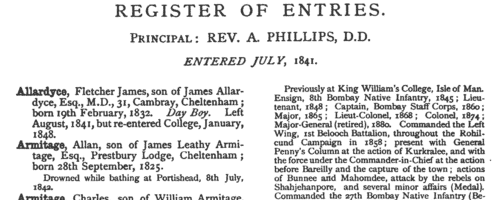
| Boys entering Leeds Grammar School: Upper (Classical) Department
(1858)
The admission books for Leeds Grammar School from 1820 to 1900 were edited by Edmund Wilson and published in 1906. The series of registers is almost complete for the period, there being in addition admission registers for the Lower (or Commercial) Department from 1856 to 1865, and lists of boys in the school in 1856, and in the Commercial Department in 1861. The entries are arranged by date or term of admission: a sequential number is given first, then surname, christian name, and, after a dash, father's christian name, occupation, and address; another dash, and then the age of the boy at admission, and often his year of leaving (with the abbreviation r. for 'removed' or 'left'). r.* means left without notice; (o) or S. or Stranger or Foreigner indicates a boy not on the foundation. The editor was unable to divine the meaning of the abbreviation (Q) or the asterisks prefixed to most entries in 1856 to 1860, but dutifully copies them into the text. In smaller type he then proceeds, where possible, to add some information about the boy's subsequent career.MAUDE. Cost: £4.00.  | Sample scan, click to enlarge
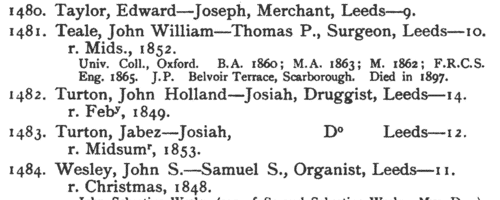
| Dissolutions of partnerships in England and Wales
(1858)
Perry's Bankrupt and Insolvent Gazette, issued monthly, included lists of dissolutions of partnerships gazetted in England and Wales. The names of the partners are given in full, surnames in capitals, followed by trade and address, and date of the end of the partnership. Each entry usually ends with the phrase 'Debts by ...', indicating which partner intended to continue, and resume the responsibilities of, the business. This is the index to the names of the partners, from the issues from January to December 1858.MAUDE. Cost: £6.00.  | Sample scan, click to enlarge
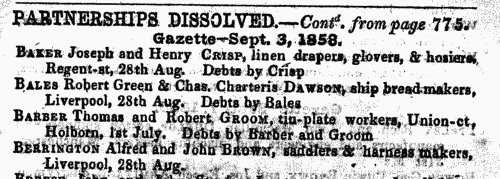
| Boys entering Cheltenham College
(1859)
Cheltenham College 'was founded in order to provide for the sons of gentlemen a Classical, Mathematical, and General Education of the highest order, on moderate terms, in strict conformity with the principles and doctrines of the Church of England.'
Andrew Alexander Hunter, the college registrar, compiled the first edition of the College Register in four parts from 1883 to 1886: these merely listed the boys by term of entry, with their dates of birth and names and addresses of their fathers. Circulars were also sent out to all Old Cheltonians whose addresses were known, requesting additional details. On the basis of the returns from these and Hunter's further researches, this much fuller register was published in 1890.
The information after each boy's name is given (where known and applicable) in this format: father's full name and address as of the time the boy entered the college; class and department on entering the college (classes being number from 1 downwards, and these again divided into A and B, some into C and D, others into P (Principal's side) and V. P. (Vice-Principal's side) - 1A was the highest class in each department: besides this, certain others were called Addiscombe, Woolwich, Civil, Direct, Line, Sandhurst, Naval, Special, Preparatory, Latin, and India Civil) and the same on leaving, name of Boarding House (or 'Day Boy'), scholastic and athletic honours attained at the college, and subsequent career (including date and place of death, or present address in 1890, if known).MAUDE. Cost: £4.00.  | Sample scan, click to enlarge
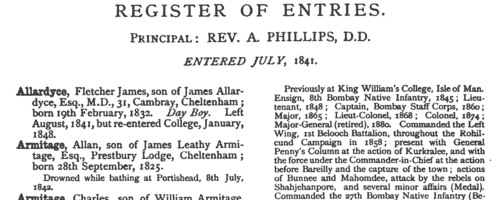
| Boys entering Wellington College in Berkshire
(1860)
Wellington College, near Wokingham, was originally founded for the education of sons of military officers. A register of boys entering the school from First Term 1859 to Michaelmas 1933 was compiled by F. G. Lawrence for the Old Wellingtonian Society. In each entry the boy's name is given in full, in bold, surname first; age at entry (usually 11 to 14); then, in brackets, the name of the dormitory or house to which he belonged, in italics, with the years of his stay; then his father's name (usually surname and initials, but not christian name) with military decorations where appropriate. School prefects and captains are noted as such; if the boy played cricket for the school, XI with the years; academic honours, scholarships, &c.; a brief biography; and date of death, or (where known) address in 1933. Year of marriage is given, and sometimes the wife's name and/or her father's name. Clearly, those boys who kept contact with the school and/or had distinguished military careers have detailed entries; others disappeared into oblivion on leaving.MAUDE. Cost: £6.00.  | Sample scan, click to enlarge
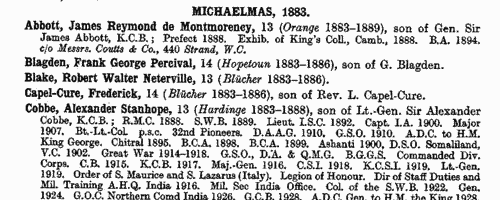
| Members of Oxford University
(1860)
The Oxford University Calendar for 1860 includes this list of all living members of the university, i. e. not only undergraduates and members of staff, but also all surviving graduates from earlier generations. The names are arranged alphabetically by surname, then by college in order of foundation. Surnames are given, initials, highest degree, name of college, and then the year of graduating the first degree. For undergraduates only name and college is given. An asterisk before a surname indicates a member on the foundation of the college. MAUDE. Cost: £4.00.  | Sample scan, click to enlarge
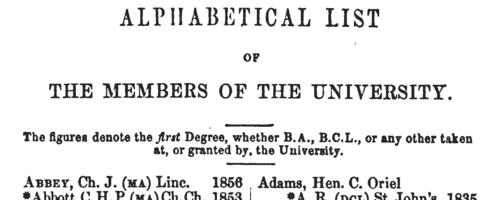
| Officers of the British Army
(1860)
The New Annual Army List first lists officers of the rank of major and above, by rank, and with dates of appointment to each successive higher rank, and (where appropriate) when placed on half pay. An asterisk indicates temporary rank; a superscript p shows that a commission was purchased; a dagger shows officers on the half pay of their last regimental commission. An ornate W indicates those officers actually present in any of the actions of 16, 17 or 18 June 1815 and therefore awarded the Waterloo Medal; P is put before the name of an officer who served in the Peninsula or the South of France; T for the Battle of Trafalgar; VC for the Victoria Cross. For each officer in this section, the final column notes his then present or immediately former regiment and/or office, if any. Next, all the officers of the army are listed, down to the rank of ensign, by regiment or corps, giving rank, name, date of rank in the regiment, and date of rank in the army, with occasional further notes. Again, holders of medals are duly noted, as in the first list. For each regiment the paymaster, adjutant, quartermaster, surgeon and assistant surgeons are named, as well as the civilian agent; and the regimental motto, battle honours, and colours of the facings and lace of the dress uniform are stated. After the British regiments of the line, the Rifle Brigade, the officers of the West India infantry, the Ceylon rifles, the Cape Mounted Riflemen, the Royal Canadian Rifles, St Helena Regiment and the Gold Coast Artillery Corps are given; then the officers of the garrisons and other military establishments; the Royal Artillery; Royal Engineers; Royal Marines; Commissariat Department; Medical Department; Staff Officers of Pensioners; Chaplains' Department; Staff (of Great Britain, Australia, Bahamas, Bermuda, British Columbia, Cape of Good Hope, Ceylon, East Indies, Falkland Islands, Gibraltar, Heligoland, Hong Kong, Ionian Islands, Jamaica (including Honduras), Malta, Mauritius, Newfoundland, North America, St Helena, the Western Coast of Africa, and the Windward and Leeward Islands); Military and Civil Department; and Barrack Masters. Then there is a separate list of officers retained on retired full pay and half pay (including the German Legion, the Brunswick Cavalry, the Brunswick Infantry, Chasseurs Brittaniques, Royal Corsican Rangers, the Greek Light Infantry, Royal Malta Regiment, Meuron's Regiment, Roll's Regiment, Sicilian Regiment, Watteville's Regiment, the York Light Infantry Volunteers, Foreign Veteran Battalion and the Foreign Corps of Waggoners).MAUDE. Cost: £4.00.  | Sample scan, click to enlarge
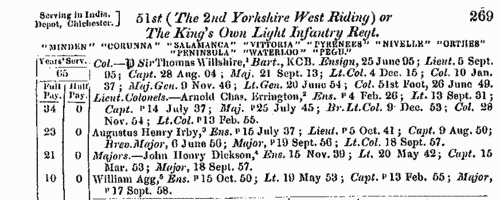
| Patentees of New Inventions
(1860)
Abstracts of British patents for new inventions applied for and granted from 1 January to 31 December 1860: giving date, name and address, and short description of the invention. It is then stated whether 'Letters patent sealed' or 'Provisional protection only'.MAUDE. Cost: £6.00.  | Sample scan, click to enlarge

| Queen Victoria's Household
(1860)
This list of the Queen's Household comprises: The Lord Chamberlain's Department; Office of the Robes; Medical Department; Chapel Royal, St James's; Chapel Royal, Whitehall; Windsor; Hampton Court; Kensington; The Lord Steward's Department; Board of Green Cloth; Pay Office; Ewry; Wine and Beer Cellars; Kitchen; Confectionery; Pastry; Bake House; Coffee Room; Table Deckers; Silver Pantry; Coal Yard; Lamplighters; Gentlemen Porters; Porters; Stewards' Room; Servants' Hall; State Porters; Marshalmen; Coroner; Almonry; Gardeners; Yeomen of the Guard; Gentlemen-at-Arms; Master of the Horse's Department; and The Royal Hunt.MAUDE. Cost: £4.00.  | Sample scan, click to enlarge

| Boys entering Wellington College in Berkshire
(1861)
Wellington College, near Wokingham, was originally founded for the education of sons of military officers. A register of boys entering the school from First Term 1859 to Michaelmas 1933 was compiled by F. G. Lawrence for the Old Wellingtonian Society. In each entry the boy's name is given in full, in bold, surname first; age at entry (usually 11 to 14); then, in brackets, the name of the dormitory or house to which he belonged, in italics, with the years of his stay; then his father's name (usually surname and initials, but not christian name) with military decorations where appropriate. School prefects and captains are noted as such; if the boy played cricket for the school, XI with the years; academic honours, scholarships, &c.; a brief biography; and date of death, or (where known) address in 1933. Year of marriage is given, and sometimes the wife's name and/or her father's name. Clearly, those boys who kept contact with the school and/or had distinguished military careers have detailed entries; others disappeared into oblivion on leaving.MAUDE. Cost: £6.00.  | Sample scan, click to enlarge
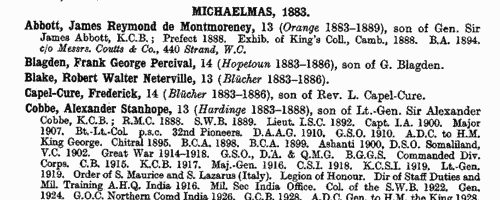
|
Research your ancestry, family history, genealogy and one-name study by direct access to original records and archives indexed by surname.
|












